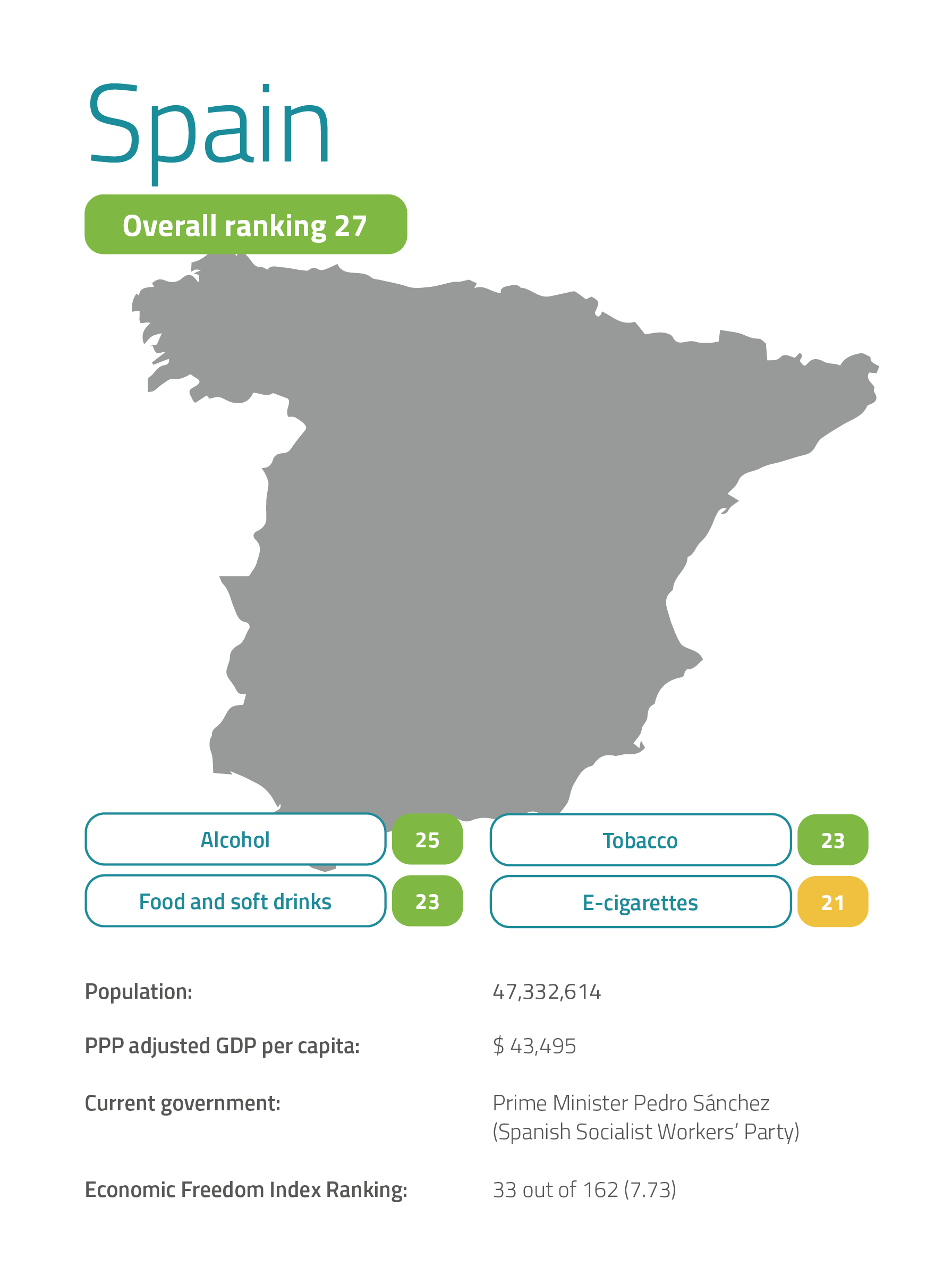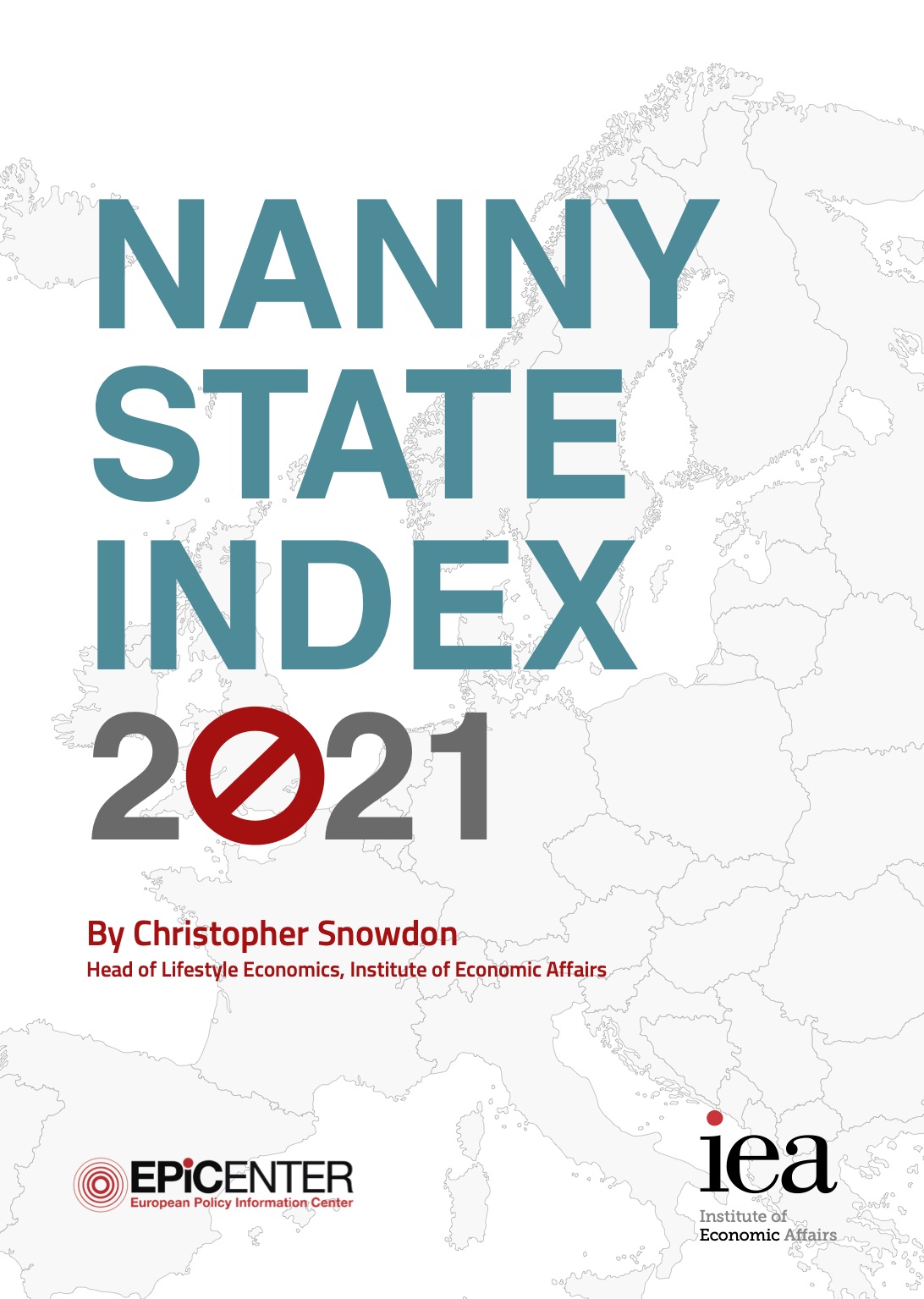
Spain is one of the freest country in the list when it comes to lifestyle matters. With relaxed licensing laws, it has some of the lowest rates of tax on beer and spirits and, as in most southern European countries, there is no duty on wine. Some local councils have banned happy hours and/or bulk buys, but there are no national prohibitions on either. Once adjusted for income, Spain’s cigarette taxes are below average and there is no tax on e-cigarette fluid.
Alcohol advertising is quite rigidly regulated in broadcast media. Spirits cannot be advertised on television or in places where alcohol consumption is not permitted. Beer and wine can only be advertised on television after 8.30 pm.
In June 2020, the Spanish government began working on a new tobacco law, with higher taxes and further restrictions on where people could smoke, including a proposed ban on smoking in cars. Nothing has come of this yet. Traditionally a smoker-friendly country, Spain has had a workplace smoking ban since 2005 and a total ban on smoking in bars and restaurants since 2011. Smoking is banned in a few outdoor areas as well, including schools, hospitals and playgrounds. During the COVID-19 pandemic, Spain banned smoking and vaping in outdoor public places if it was not possible to maintain two metre social distancing. Tobacco taxes are about average for an EU country.
Vaping is banned in various public places, such as in schools and on public transport, but it is left to the owner’s discretion in private workplaces, bars and restaurants. Cross-border sales of e-cigarette fluid is banned. A scare campaign against vaping in 2014 led to the e-cigarette market crashing. Today, only one per cent of Spaniards are regular vapers and there are more smokers than there were fifteen years ago.
In addition to national restrictions, some regions have nanny state regulations of their own. In April 2016, the Basque Country Parliament banned smoking (and drinking) in sports stadia. Smoking will be banned on four beaches in Barcelona from May 2021. The region of Catalonia has had a soft drinks tax since May 2018. The rate is two tiered with drinks containing 5 to 8 grams of sugar per 100ml taxed at €0.08 per litre while drinks which have more than 8 grams of sugar per 100ml are taxed at €0.12 per litre.
With thanks to Antonio O’Mullony at Civismo
About
The Nanny State Index (NSI) is a league table of the worst places in Europe to eat, drink, smoke and vape. The initiative was launched in March 2016 and was a media hit right across Europe. It is masterminded and led by IEA’s Christopher Snowdon with partners from all over Europe.
Enquiries: info@epicenternetwork.eu
Download Publication

Previous version: 2019
Categories
About the Editor
Christopher Snowdon is the head of Lifestyle Economics at the Institute of Economic Affairs. His research focuses on lifestyle freedoms, prohibition and policy-based evidence. He is a regular contributor to the Spectator, Telegraph and Spiked and often appears on TV and radio discussing social and economic issues.
Snowdon’s work encompasses a diverse range of topics including ‘sin taxes’, state funding of charities, happiness economics, ‘public health’ regulation, gambling and the black market. Recent publications include ‘Drinking, Fast and Slow’, ‘The Proof of the Pudding: Denmark’s Fat Tax Fiasco’, ‘A Safer Bet’, and ‘You Had One Job’. He is also the author of ‘Killjoys’ (2017), ‘Selfishness, Greed and Capitalism’ (2015), ‘The Art of Suppression’ (2011), ‘The Spirit Level Delusion’ (2010), ‘Velvet Glove, Iron Fist’ (2009).
Spain 2021

Spain is one of the freest country in the list when it comes to lifestyle matters. With relaxed licensing laws, it has some of the lowest rates of tax on beer and spirits and, as in most southern European countries, there is no duty on wine. Some local councils have banned happy hours and/or bulk buys, but there are no national prohibitions on either. Once adjusted for income, Spain’s cigarette taxes are below average and there is no tax on e-cigarette fluid.
Alcohol advertising is quite rigidly regulated in broadcast media. Spirits cannot be advertised on television or in places where alcohol consumption is not permitted. Beer and wine can only be advertised on television after 8.30 pm.
In June 2020, the Spanish government began working on a new tobacco law, with higher taxes and further restrictions on where people could smoke, including a proposed ban on smoking in cars. Nothing has come of this yet. Traditionally a smoker-friendly country, Spain has had a workplace smoking ban since 2005 and a total ban on smoking in bars and restaurants since 2011. Smoking is banned in a few outdoor areas as well, including schools, hospitals and playgrounds. During the COVID-19 pandemic, Spain banned smoking and vaping in outdoor public places if it was not possible to maintain two metre social distancing. Tobacco taxes are about average for an EU country.
Vaping is banned in various public places, such as in schools and on public transport, but it is left to the owner’s discretion in private workplaces, bars and restaurants. Cross-border sales of e-cigarette fluid is banned. A scare campaign against vaping in 2014 led to the e-cigarette market crashing. Today, only one per cent of Spaniards are regular vapers and there are more smokers than there were fifteen years ago.
In addition to national restrictions, some regions have nanny state regulations of their own. In April 2016, the Basque Country Parliament banned smoking (and drinking) in sports stadia. Smoking will be banned on four beaches in Barcelona from May 2021. The region of Catalonia has had a soft drinks tax since May 2018. The rate is two tiered with drinks containing 5 to 8 grams of sugar per 100ml taxed at €0.08 per litre while drinks which have more than 8 grams of sugar per 100ml are taxed at €0.12 per litre.
With thanks to Antonio O’Mullony at Civismo

 Austria
Austria Belgium
Belgium Bulgaria
Bulgaria Croatia
Croatia Cyprus
Cyprus Czech Republic
Czech Republic Denmark
Denmark Estonia
Estonia Finland
Finland France
France Germany
Germany Greece
Greece Hungary
Hungary Ireland
Ireland Italy
Italy Latvia
Latvia Lithuania
Lithuania Luxembourg
Luxembourg Malta
Malta Netherlands
Netherlands Norway
Norway Poland
Poland Portugal
Portugal Romania
Romania Slovakia
Slovakia Slovenia
Slovenia Spain
Spain Sweden
Sweden Turkey
Turkey United Kingdom
United Kingdom


















